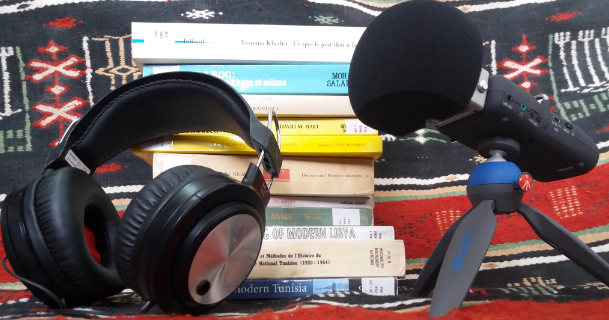
58.6K
Downloads
208
Episodes
Maghrib in Past & Present | Podcasts is a forum in which artists, writers, and scholars from North Africa, the United States, and beyond can present their ongoing and innovative research on and in the Maghrib. The podcasts are based on lectures, live performances, book talks, and interviews across the region. Aiming to project the scientific and cultural dynamism of research in and on North Africa into the classroom, we too hope to reach a wider audience across the globe.
Episodes

Wednesday Sep 25, 2019
Wednesday Sep 25, 2019
Episode 75: The Husyanid Dynasty and Spatial Control and Judicial Control of the Enslaved Blacks of Tunis
In this podcast, Dr. Ismael Montana, Associate Professor of History at Northern Illinois University, discusses the impact of the Husaynid dynasty (1705-1957) on the enslaved Sudanic communities of Tunis. Montana does so by looking at the Stambali, a ritual of musical possession based on the fusion of the Hausa Bori cult and popular Islam, performed primarily by the Sudanic communities of Tunis.
He argues that the Husaynid dynasty actively sought to transform Sudanic communities into on of several corporatist communities in the Tunisian Beylic, by means of spatial control. In the early eighteenth century, the Husaynid Beys promoted the sainthood of Sidi Saad al-Abid, a former slave from Borno, in order to serve as a rallying figure for the freed and enslaved Sudanic communities that had been settled in Tunis as a result of the trans-Saharan slave trade. The Sufi brotherhood that formed around this saint was given a judicial-administrative apparatus, designed to self-regulate the community, and structure it within the state's religio-political scheme. Montana maintains that while the Sudani community entered the Husaynid political system via the Stambali, the processes by which that group was integrated relied on its specific religious culture, which continued to set them apart from the rest of Tunisian society.
Ismael Montana's research interests include the social and economic history of slavery, culture, and citizenship in Northwest Africa and the western Mediterranean basin from the 18th century to the present. He is currently the Vice-President of West Africa Research Association (WARA).
This podcast was recorded at the CEMAT Director’s Conference on “Narratives of Legitimacy and the Maghrebi State: Power, Law and Comparison” held on 21 June 2019 in Sidi Bou Said, Tunisia.
We thank Dr. Tamara Turner, Ethnomusicologist and Research Fellow at the Max Planck Institute for Human Development, Center for the History of Emotions, for her interpretation of Natiro/ Ya Joro, from the Hausa repertoire of diwan.
Edited and posted by Hayet Lansari, Librarian, Outreach Coordinator, Content Curator (CEMA).

No comments yet. Be the first to say something!